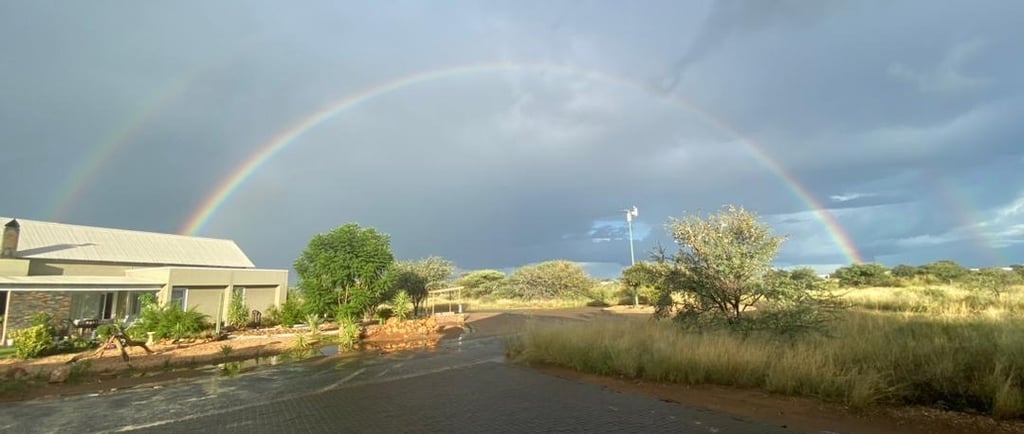Our First Month in Namibia
Learn about some of the functional details of our move to Namibia from getting groceries, pumping gas, taxies, and domestic workers
MOVING TO AFRICA
The Most High called our family to Windhoek, Namibia. As we finish out our first month of residing here, we have many reflections on the basics of life here.
Daily Conveniences
We are from Denver, Colorado. Back in Denver, we had access to enormous city environments, restaurants galore, and stores everywhere. I could use an app to have anything I wanted delivered to me within two hours. There are wonderful restaurants in Windhoek that offer gourmet foods and gluten-free and vegan options -- they just don't deliver to Omeya, so we have to go there with the kids.
We currently live at Omeya, which is nearly 30 minutes from the main city of Windhoek. Very little can be delivered here, and when deliveries come, they must pass through a security checkpoint. I need to call in the delivery to security, answer a phone call to open the boom gate inside the property, and then direct delivery drivers to find my home. It's quite the to-do and costs more than the average delivery due to the distance. They also don't accept taxis into security, which I learned the hard way when we didn't have a car.
With all of this, week one was quite interesting. There is a restaurant, store, and pharmacy here on the Omeya property, but without a car and with our out-of-shape work-at-home bodies, it was a stretch to walk all the way there. It's about a 15-minute walk from our house to get to those amenities and includes an uphill stretch.
On day one, I'm pretty sure we lived on my bag of snacks from the airport and oatmeal packets from my checked bag. I had placed an order from a group called iShopping, but at the time, the best payment method was only wire transfer, so the wire hadn't come in yet for them to deliver on day one.
On day two, we made our way down the winding road with our stroller to the restaurant so we could order enough food to fill the fridge and not need much for a day or so. We were so exhausted that we didn't try doing anything else yet. iShopping arrived later in the day with our groceries. I realized I should have ordered more because I didn't know when we'd get to receive another order.
On day three, a couple who had moved their family out came to visit us at our property. They lived across the street at Out of Nature for about five months and had friends at Omeya, so they helped us understand the basics and introduced us to a friend down the street. They even offered up their car to borrow, but we feared driving the left side and putting the car in danger and ourselves. They owned a taxi business, so they connected us with their main driver to come get us and take us to town. We hired the driver pretty much daily until we established ourselves and got our own car.
Where we shop and eat
We had come to Namibia in October 2023, so we anchored on some of the places and things we knew from that time. We knew the Grove Mall, so we went there and began frequenting a restaurant called Colcaccio where the kids could play in an outdoor area while we ate healthy food. The kids enjoyed the pizza and lasagna they served there. It became a habit the kids grew familiar with, and we always had the same waitress.
The Grove Mall has every resource, and is right across from a plaza with a store called Pupewitz where we can get our outdoor supplies (kind of like Lowes or Home Depot).
We also frequent a place called The Village Market, where they have gluten-free and vegetarian options I like, along with good coffee. They have a great event Sundays with live music, vendors, and a huge crowd.
We've tried all the grocery stores and narrowed it down to Food Lover's Market and SuperSpar, which contain different varieties of options.
We got our furniture between Nictus and CoriCraft, both stores that allowed us to pre-order from the United States and have the delivery scheduled. We wired the money to them and planned some deliveries before arrival, where the previous owners assisted, and some deliveries after arrival. We got to a house with basics such as pots and pans, beds, and blankets.
Utilities
I had the internet set up prior to moving, and the former owners worked with me to ensure it was paid ahead of time. They also prepaid a bit of electricity for us.
In our area, electricity is prepaid at the store or via your banking app. Phones are also prepaid and don't need to have a monthly billing plan. Water at Omeya is paid monthly via the HOA levy. They do expect us to respect the water and not overuse it. Domestic workers such as housekeepers, cooks, and landscapers are bused in from the neighboring communities, sometimes called informal settlements. Some also come from the city of Windhoek. We get one free ticket daily and then pay a small fee for additional workers to bus in. They provide biometric screening for all employees here to ensure they are all checked out, and they check in at the gate with a biometric scan to enter.
Hiring domestic workers
Eventually the waitress at our favorite restaurant referred us to someone who could help clean the house for me. She brought her over one day to work, and we established a rate and cadence. This helped tremendously as a 5,000-square-foot ranch home with ample outdoor space is hard to maintain. I still had work to do and was falling behind on daily tasks. Having help was amazing, yet also awkward since we'd never had a housekeeper like this.
The gardener was previously employed at the house and was willing to give us two days per week to help out.
The gardener sent his wife and friend to work at our home one weekend, which allowed us to meet them and acquire their assistance as well. One became a nanny for us, and his wife became our weekend meal prep cook to give me a day off from cooking. So nearly every day now, we have a worker in our home to help with daily chores and tasks. And I can't imagine life without them. It is a responsibility also since we also need to get up and open the door for them, also direct them with delegation.
The previous owners had a full-time worker and they provided her a key that was left outside for her to access the house. We are city people not ok with leaving doors open and having keys sitting in obvious places in that way. Many here don't lock their doors because we are surrounded by an electric fence and have security roaming.
Driving
In order to get around here, it was necessary to have a car and drive. Benhaya took that on as an important task, which the taxi driver helped him with by serving as his driving trainer and letting him practice. He also then served as his car-buying consultant. Driving is on the left side of the road, and the driving seat is on the opposite side of the car. This also means the blinkers and buttons are in a different spot. It takes getting accustomed to.
Prior to leaving we got an international drivers permit from AAA that allowed us to have something to bring along to prove we should be driving there.


